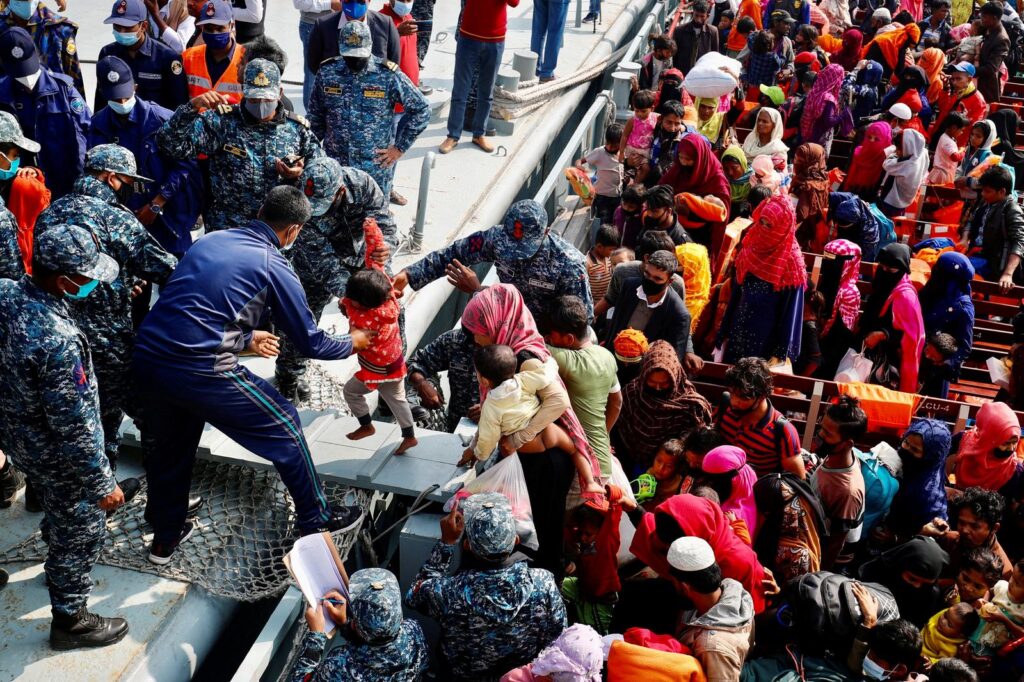Lessons For Ukraine From The Rohingya Crisis
May 13, 2022 | Pratirodh Bureau
FILE PHOTO: Rohingya refugees get off from a navy vessel as they arrive at the Bhasan Char island in Noakhali district, Bangladesh
Countries in Europe have opened their borders and homes to Ukrainians fleeing Russian aggression. Of course, Ukrainians are far from the first group of refugees to need shelter and welcome from host countries.
Refugees are vulnerable people who, because of limited opportunities in refugee camps, can be exposed to human trafficking, criminal activities, drug peddling, prostitution and radicalisation. There have already been concerns that Ukrainian refugees are being targeted for human or sex trafficking by organised groups and individuals.
But a refugee crisis doesn’t simply end with placing vulnerable, often traumatised people in congested camps or even family homes. As conflicts continue and global priorities change, even the most sympathetic communities can lose their enthusiasm for hosting.
Bangladesh, a highly populated country with its own challenges and resource constraints, has become in the last five years one of the leading countries hosting displaced people. Over one million Rohingya refugees from Myanmar entered Bangladesh in 2017, living mainly in makeshift camps located in Ukhiya and Teknaf, two areas in the Cox’s Bazar district.
In the early days, Bangladeshi communities were lauded for their response to the influx of Rohingya refugees, providing lifesaving assistance before the state, non-governmental organisations and the international community.
The Bangladeshi government has been working with various humanitarian actors to ensure that various essential needs such as food, shelter, cooking materials, healthcare, and education are met in camps.
But any positive camp conditions are overshadowed by government policies that restrict the Rohingyas’ movement and right to work. What’s more, in 2019 barbed wire was erected around the camps.
Although host communities were initially highly compassionate and supportive, recently there has been tension. The situation is an example of how sympathetic communities can become frustrated, angry or even hostile over time. We believe this can offer some important insights into how the Ukrainian refugee crisis could play out if the enthusiasm and resources dry up in coming months.
Growing Tensions
We interviewed 20 members of the host community and 20 Bangladeshi humanitarian workers, who described a decline in sympathy towards the Rohingyas. The findings surprised us and may not be representative of the entire Rohingya population living in Bangladesh.
We interviewed Rohingya refugees for a previous study, and found that they felt extremely grateful to the Bangladeshi hosts for their hospitality. But, host communities’ increasingly negative perception of Rohingya refugees threatens their peaceful coexistence. As one humanitarian worker said: “Many local people had to abandon their houses and land that are now located inside the Rohingya camps. After the settlement of Rohingyas in the camps, when [locals] tried to access or use their lands again, they were regularly countered by the Rohingyas who are very compact as a group. People [locals] once welcomed are now quite aggressive towards them, [which has] resulted in violent clashes.”
There have been many allegations levelled against the Rohingyas, including that they are involved in radical extremist activities and pose security threats. Bangladesh’s prime minister has openly called the Rohingyas a “burden”.
Rohingyas in Bangladeshi camps have been lured by criminal gangs and human traffickers and become involved in various criminal activities and drug peddling. One community leader cited this as a factor behind the recent contempt, saying they are taking part in “evil deeds”.
Bangladesh officially recognises the Rohingyas as “Forcibly Displaced Myanmar Nationals” instead of refugees, which prevents them from being able to work. Recent evidence suggests that as a result of this, many Rohingyas have resorted to petty crimes and theft. As one humanitarian worker told us: “Previously, there were very few incidents but now, these are frequent. Every night something is being stolen from the houses of the local community. Also, thousands of humanitarian workers live here and usually possess mobile phones, laptops, or other electronic items. Their houses are also targets for theft.”
Lessons For Ukrainian Refugees And Their Hosts
Like the early days of the current Rohingya crisis, there has been a certain amount of positivity and enthusiasm about hosting Ukrainian refugees. However, there might also be some early signs of exhaustion and a tinge of scepticism, as we have observed in Bangladesh.
If a crisis is dealt with on an ad-hoc basis and not addressed as a long-term issue, refugees may turn to alternative risky opportunities which might put them in harm’s way. As we have seen in Bangladesh, this could jeopardise the whole objective of supporting the refugees. There are concerns about resource availability that would be required to host the large number of Ukrainian refugees. Already, there is evidence that some Ukrainians may be taken advantage of through the systems designed to help them.
It is important to have a longer-term plan for jobs, safety and healthcare among the hosting governments, EU, UN bodies and civil society organisations that are actively involved in hosting the Ukrainian refugees, so the situation does not follow the precedent set in Bangladesh.
(This article has been republished from The Conversation under a Creative Commons license. Read the original article).
